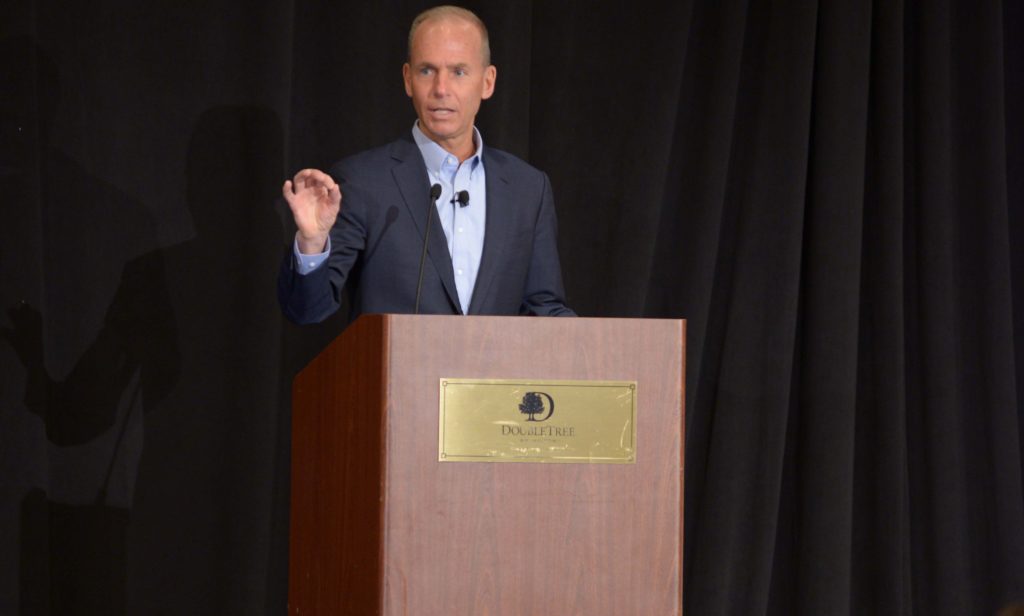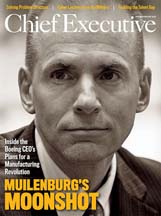
CEOs around the world, despite their challenges of the day, awaken to the joy that they are not Boeing CEO Dennis Muilenburg. Muilenburg, a smart, honest, humble, well-regarded engineer, who has been with Boeing for his full 35-year career. He has been navigating Boeing very successfully since assuming the daunting role of following predecessor Jim McNerney’s unparalleled ten-year run as Boeing’s most successful CEO ever. Yet now he and Boeing are facing intense scrutiny following this week’s grounding by the FAA of their hugely popular 737 Max 8 and Max 9 series planes.
On March 10, an Ethiopian Air Boeing 737 Max crashed killing all 157 people on board just five months after a Lion Air Boeing 737 Max crashed into the Java Sea killing 189 people. This catastrophic loss of life on the equipment made by your firm, regardless of the cause or context, is enough to place this crisis in a category different from most others CEOs ever face. However, the cause and context of this tragedy make Muilenburg’s leadership challenges uniquely difficult.
The association with the human carnage and the suffering of the victim’s families is, of course, the greatest weight on his shoulders—even if Boeing has done no wrong. The US government’s diffuse role historically between the FAA’s data collection and the National Transportation Safety Board’s investigations has never been clear. In this case, it was further complicated by inconsistent statements from these agencies, their highly respected past leaders, and the White House. A former Boeing official being Acting Secretary of Defense did not help public impressions. The government’s reliance upon Boeing’s unique expertise in understating the role of sensors, hundreds of computers, millions of lines of code, and the new MCAS autopilot system complicates things further.
As Boeing and the US government hesitated making a decision while analyzing the data, 42 other nations— from China to Canada—acted two days earlier, using the same available satellite tracking of the problematic flight paths of both fallen planes, finding troubling parallels. Whether this was schadenfreude of adversary nations, the resentment of allies to new US jingoistic “America First” proclamations, the loss of trust over the abrogation security treaties and trade alliances, or suspicion over imputed business-government coziness, the US has lost face. Finger-pointing has broken out over the FAA’s guidance that added training may not have been needed and now voices are questioning the credentialing of certification of pilots in new technologies.
While US trade unions had been largely supportive of Boeing and the air carriers on safety matters, that unity began to weaken. Reports of pilot complaints about the comprehensiveness of the manuals has surfaced. US air carriers stayed supportive of Boeing’s safety record and corporate values but non-US carriers began to rethink their enthusiasm for the 4,500 planes they had on order and whether to demand compensation of for lost revenues from grounded flights. Meanwhile, unthinkable liability issues have analysts weighing the potential impact of self-insurance vs commercial carrier coverage, despite Boeing’s excellent balance sheet.
Over t he past 40 years, I have personally studied many brilliantly-handled recoveries from wide-ranging business setbacks, and even tragic losses of life. Jim Burke at Johnson & Johnson; Edward Harness at Proctor & Gamble; Andrew Young and the Atlanta Olympics; Jamie Dimon of JP Morgan; Jimmy Dunne of Sandler O’Neill; Ray Gilmartin of Merck; Dave Neeleman of Jet Blue; Anne Mulcahy of Xerox; Alan Mulally of Ford; Jim Kelly of UPS; Stuart Miller of Lennar; Bob Eckert of Mattel; Tim Sloan of Wells Fargo; Arne Sorenson of Marriott, Mary Barra of GM; to name just a few.
he past 40 years, I have personally studied many brilliantly-handled recoveries from wide-ranging business setbacks, and even tragic losses of life. Jim Burke at Johnson & Johnson; Edward Harness at Proctor & Gamble; Andrew Young and the Atlanta Olympics; Jamie Dimon of JP Morgan; Jimmy Dunne of Sandler O’Neill; Ray Gilmartin of Merck; Dave Neeleman of Jet Blue; Anne Mulcahy of Xerox; Alan Mulally of Ford; Jim Kelly of UPS; Stuart Miller of Lennar; Bob Eckert of Mattel; Tim Sloan of Wells Fargo; Arne Sorenson of Marriott, Mary Barra of GM; to name just a few.
I have also studied the bungled responses Mark Zuckerberg and Sheryl Sandberg at Facebook; Elon Musk of Tesla; Oscar Munuz of United Airlines; Richard Smith of Equifax; Mickey Arison of Carnival Cruise Lines; Tony Hayward and the BP of the Deepwater Horizon disaster; and Larry Rawls of the Exxon-Valdez disaster.
Those horrible, but in many ways simpler far situations, speak to what must be on Muilenburg’s daily to-do list now:
Board Oversight and Partnership — Don’t leave the board in the dark, catching up by reading headlines. Is there an informal expert special committee for backup and brainstorming?
Objective Investigation to Command the Facts – Can we show we are mastering the facts even as outside experts are sharing data with the media?
Protect Whistleblowers — Don’t shoot messengers if there are those internally who have constructive but critical informal information.
Embrace External Critics & Government Authorities — Recognize the legitimacy of those asking tough questions and stay in constant contact.
Preparation for Truthful Public Comment — Be sure of the accuracy of Boeing comments but do not be silent if you’re uncertain. Just say what is known and what is not, ie: is the software fix enough or how long will the grounding be appropriate?
Strengthen Media Engagement – Avoid delays and stonewalling and speak with a single unified rapidly responsive voice.
Fortify Alliances of Shared Fate — Many subcontractors are in trouble, air carriers are worried, and Aribus has parallel interests.
Act Decisively Despite Attorney Handwringing – Public safety and public image must outweigh all short-term commercial impacts, no matter what the lawyers say. A good example is to follow the military, where unexplained failure leads to instantly grounding any similar-series equipment.
Reframe the Situation Showing An Accountable Human Face of Leadership — Do not hide behind bureaucratic process or delegate bad news to subordinates. Show authentic personal empathy, contrition and atonement when warranted—and avoid being over-lawyered.
My calls to involved parties indicate that Muilenburg is working hard on all these fronts, but it is far easier for financial analysts, journalists, academics and even other CEOs on the outside to critique than it is for management to execute perfectly on all dimensions each hour. I know that Muilenburg, like McNerney, respected Louis Pasteur’s dictum that “chance favors the mind that is prepared.” Following that advice will serve him well right now.

Chief Executive Group exists to improve the performance of U.S. CEOs, senior executives and public-company directors, helping you grow your companies, build your communities and strengthen society. Learn more at chiefexecutivegroup.com.
0

1:00 - 5:00 pm
Over 70% of Executives Surveyed Agree: Many Strategic Planning Efforts Lack Systematic Approach Tips for Enhancing Your Strategic Planning Process
Executives expressed frustration with their current strategic planning process. Issues include:
Steve Rutan and Denise Harrison have put together an afternoon workshop that will provide the tools you need to address these concerns. They have worked with hundreds of executives to develop a systematic approach that will enable your team to make better decisions during strategic planning. Steve and Denise will walk you through exercises for prioritizing your lists and steps that will reset and reinvigorate your process. This will be a hands-on workshop that will enable you to think about your business as you use the tools that are being presented. If you are ready for a Strategic Planning tune-up, select this workshop in your registration form. The additional fee of $695 will be added to your total.

2:00 - 5:00 pm
Female leaders face the same issues all leaders do, but they often face additional challenges too. In this peer session, we will facilitate a discussion of best practices and how to overcome common barriers to help women leaders be more effective within and outside their organizations.
Limited space available.

10:30 - 5:00 pm
General’s Retreat at Hermitage Golf Course
Sponsored by UBS
General’s Retreat, built in 1986 with architect Gary Roger Baird, has been voted the “Best Golf Course in Nashville” and is a “must play” when visiting the Nashville, Tennessee area. With the beautiful setting along the Cumberland River, golfers of all capabilities will thoroughly enjoy the golf, scenery and hospitality.
The golf outing fee includes transportation to and from the hotel, greens/cart fees, use of practice facilities, and boxed lunch. The bus will leave the hotel at 10:30 am for a noon shotgun start and return to the hotel after the cocktail reception following the completion of the round.